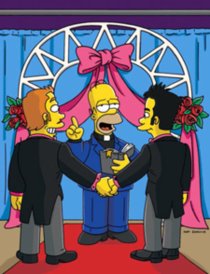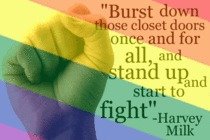 People were a bit perplexed earlier this summer when both President Obama and Sen. John McCain were discussing reality show star and cultural anomaly Snooki. Newsman Thomas Roberts, however, wasn’t at all surprised. In fact, he anticipated it.
People were a bit perplexed earlier this summer when both President Obama and Sen. John McCain were discussing reality show star and cultural anomaly Snooki. Newsman Thomas Roberts, however, wasn’t at all surprised. In fact, he anticipated it.“Politics has always been a form of theater in itself,” he said. “Everyone’s realizing that social media matters, pop culture matters, and being informed on all fronts matters. It’s a perfect and natural progression: if we care about Snooki as a country, logically politicians should, too.” Roberts understands the ins-and-outs of politics and pop culture’s intersections, because he’s been caught in the crossfire.
The 37-year old journalist made national headlines back in 2005, when he admitted publicly that he had been molested by his trusted priest while growing up in Towson, Maryland. Then at CNN, Roberts helped put a familiar face to the Catholic church’s growing scandals, thus crossing the line from news man to news story. Five years later, during an interview at the Rock Center Cafe beneath NBC’s New York offices, Roberts remarked, “That was going to be an albatross around my neck for my entire life, so why not just take a moment, stand still for a minute and get rid of it.”
Though some, especially LGBT activists, have lambasted the Church and its beliefs as a whole, Roberts refuses to turn his back on the religion he’s always known and loved. “Giving up spirituality completely was never an option. That would have given what happened to me way too much power and control over my life to take away something that was so important to me.” He does, however, understand why people may be confused by his decision, telling me, “People might be confused by that, but I want to stress that it’s not so much about being a practicing Catholic as it is being a person who was raised Catholic and has a spirituality with which they feel connected.”
Roberts again became a news story two years later, after coming out of the closet, a rare move for an industry where objectivity remains of the utmost importance, and which conservatives often associated with a “liberal agenda.” The announcement birthed a flurry of attention that would make some journalists uncomfortable. Roberts took it all with a grain of salt. “If viewers know me professionally, why not know me personally?” he explained. “I mean, to a point we all have our private lives, but I don’t think there’s anything wrong with my personal life, so why not share it with everybody?” Some, however, suggest that Roberts compromised his journalistic integrity.
That was exactly what some suggested after Roberts interjected his personal experience into an interview about Ken Mehlman’s coming out last month. “I think for probably most heterosexual Americans this isn’t going to come as a big deal, but I think for millions of gay and lesbian Americans—me included—find this to be kind of a shocking admission,” he told his guest, gay Republican activist Chris Barron. A few conservatives took Roberts’ comments as “evidence” that he’s biased for gay rights. They’ve said the same thing about Vaughn Walker, the allegedly gay judge who overturned California’s Proposition 8. Roberts disagrees.
“For all the people watching that interview, it added a point of interest coming from a person that understand why some people would want to know why this person chose to come out. I was curious.” Nor does Roberts buy into the conservative “gay judge” argument, which claims Walker would intentionally tip the scales of justice for gay rights. “Someone’s personal life doesn’t take away from that fact that, as a professional, they can table their personal lives when making decisions.”
Roberts doesn’t think that gay rights should even be made into a political issue. “When it comes to where we are in this country with certain issues, like civil rights for gays and lesbians, the media can continue to open up the dialogue,” he asserts. “It’s not really a red or blue issue; it’s an issue of humanity and justice. It shouldn’t be so politicized. It’s just about human beings.”
Roberts understand that the “media” often gets labeled as “liberal.” He wants people to know, however, that he and his colleagues are, for the most part, just as invested in current affairs as the average American. “I’m talking about these stories—job creation, what it’s like to try to sell a house and not find buyers,” he says.
“I’ve lived through this stuff, and this resonates with me. I feel the same thing that all other Americans do when it comes to not feeling secure at all times.” He goes on, “There are still enough of us out there who consider ourselves to be journalists, as opposed to pundits that stir things up. I’m just a regular guy who’s telling people the facts.”
While not everyone agrees on which course our nation should take, Roberts insists that the best thing any American can do is also the easiest: vote. “The best thing that we can do as a country is vote. It’s an important power and responsibility.”
Most importantly, voting keeps the States united: “Voting is the one thing that really unifies us as a country. There are certain dates that all adults are expected to go out and cast their votes as a country. That’s a really beautiful and powerful thing.” Spoken like a true American.












No comments:
Post a Comment